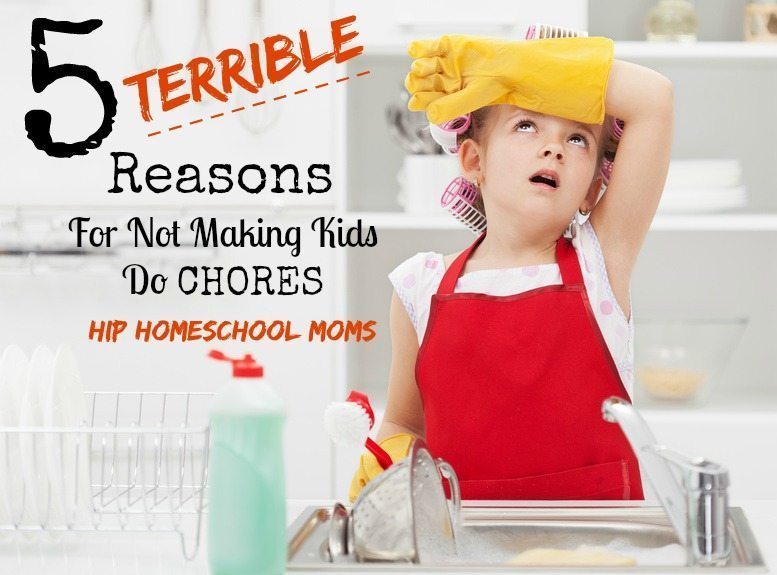5 Terrible Reasons for Not Making Kids Do Chores
Chores (or Life Skills or whatever more pleasant name you wish to give to common household tasks) don’t generally rank up there at the top when we start listing school subjects we consider most important. Plenty of other things usually take priority, and yet, while we’re so absorbed in teaching our kids the “important stuff,” I’m pretty sure we wind up neglecting the really important stuff.

Because, let’s be honest, while the Pythagorean Theorem is useful, knowing how to run a washing machine is really more so, at least in the sense of practical, day-to-day living. We stress so much the importance of gaining knowledge, and in the process we sometimes neglect some of the lessons our kids need to be learning most, like responsibility, work ethic, taking ownership of possessions and property, and the importance of everyone in a family pulling his or her own weight.
These are vital lessons and we know it, and yet sometimes we choose to focus on everything else and then make excuses for why we can’t teach our kids to do chores. And some of our reasons can be pretty terrible!
Terrible Reason #1: I can do it so much better than my kids can.
Okay, Moms: Insert whatever chore you can think of in place of the word “it” in the above sentence and, yes, you probably do it better than your 6-year-old. But, then again, how is that 6-year-old ever going to learn how to out-mop or out-dust or out-wash Mom if he is never allowed to do the work, learn from his mistakes, and improve upon his efforts from day to day?
Of course we can do it better than our kids! But I for one would love to train a child to out-do me, especially when it comes to my least favorite chores!
Terrible Reason #2: I get so tired of my kids complaining about their chores.
First of all, it would do us good sometimes to remember who is in charge in our homes. (Hint, hint: It’s NOT the kids!)
But if we’re put off by complaints from the kids, then we need to stop to consider our logic. My kids sometimes complain about taking baths, brushing their teeth, or having to put on real clothes to go to the store. That does NOT stop me from forcing those things on them.
Terrible Reason #3: I want my kids to just be kids.
This one can get slightly more complicated.
I have a dear friend who had massive household responsibility, including the care of younger siblings, thrust upon her at a very young age while her parents pursued other interests. This mom deals with hurt and resentment even decades later, and making her kids do chores was a hard thing for her. She struggled so much with a fear of depriving her children of the childhood she feels she never got to enjoy.
Cases like hers are rare, but they do exist. I think we all experience a little tinge of sadness at the thought of how brief those carefree days of childhood really are and how soon our kids will be loaded down with the responsibilities of adulthood. But let’s face it, mamas: We aren’t raising our kids to be kids. We’re raising them to be adults. We aren’t out to break any child labor laws, but neither do we want them growing up without a basic sense of responsibility and work ethic. And learning these values needs to begin early.
Terrible Reason #4: I have boys.
Umm…what?
First of all, chores can go far beyond things like mopping and dusting and washing clothes. Granted, not as many boys are being raised on farms where they have to milk cows or clean out stalls, but grass has to be mowed and garages need to be swept and cars need to be washed. Boys (as well as girls) are often more than capable of tackling these tasks.
But it doesn’t hurt a boy to know how to run a vacuum cleaner or wash dishes! Keep in mind that your boys may very well spend some time out on their own unmarried, and they need to know how to take care of their places. But then what a BLESSING those boys could be to their future wives if their mamas have taught them how to do some basic housework!
Terrible Reason #5: It’s easier to just do it myself.
Okay, this is where I am most often guilty, guilty, guilty of making excuses for not teaching my kids to do chores.
It is often easier to just do it myself. That’s especially true when you first start teaching kids how to do chores. They have to be shown how to do a task, sometimes several times over. After that, they need to do it supervised until you’re fairly confident they know what to do and how to do it. But then when they start doing the chore on their own, they need to know Mom will be coming back to review their work and give her approval or make them do it again.
It’s not a quick and easy process. Some chores are easier for kids to master than others, but, yes, sometimes it seems easier to just do it ourselves.
But kids need to learn certain skills, and we’re not helping them or ourselves by not taking the time to teach them.
————————————————-
Do you make your kids do chores? What are the best lessons your kids have learned from doing chores? What chores do you have your children do on a regular basis?








I should have known you were religious. The Bible is an open cesspool of misogyny, so it makes sense that on terrible reason 4, not once do you say that a woman isn’t required to do housework. All you do is assign chores based on gender roles (a woman can also take out trash and mow her own lawn) and think of a man who knows how to do “basic housework” as a “blessing,” but not something that should 100% be the norm. They shouldn’t learn housework because they may live alone without a woman around to be their maid,. They should learn housework because it’s not up to just a woman to keep the house they SHARE clean. Give up sexism and try feminism. It’ll change your life.
We believe all people should strive to be a blessing to other people–regardless of gender. Family members should especially strive to be a blessing to the people they live with. It is a fact of life that housework and yardwork must be done, and spouses (and children) who work together make the home a happier, nicer place to be.